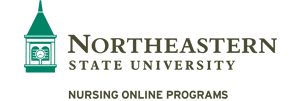Nursing administration covers a wide range of leadership roles, from nurse supervisor to chief nursing officer. Although administrators do not routinely provide direct patient care, the policies and the culture they create have tangible impacts on patients, staff and communities.
Successful nurse administrators “help lead best practices” and collaborate “across multiple disciplines within the organization,” says the American Organization for Nursing Leadership (AONL). Developing such interdisciplinary proficiencies has always been key to effective leadership, and it is now more critical than ever as the healthcare landscape evolves.
The Northeastern State University American Organization for Nursing Leadership focuses on topics relevant to today’s nurse leaders, from human resource management to healthcare finance and systems management.
What Job Responsibilities Do Nurse Administrators Have?
Nursing administration is a broad term that refers to several different leadership roles, typically within a hospital, physician’s office or long-term care facility. Standard job titles include:
- Nurse manager
- Director of nursing
- Clinical manager
- Chief nursing officer
- Clinical nurse manager
- Nurse supervisor
Nurse administrators enjoy various job responsibilities that allow them to participate in business and HR planning while continuing to develop their nursing practice. Duties may vary slightly based on the setting. Overall, nurse administrators are responsible for the well-being and aptitude of their nursing staff and the quality of care patients receive. Their primary responsibilities are:
Patient Safety
Safety is always a top priority. Administrators must ensure that their nursing staff delivers the highest level of care possible. They observe, collect data and feedback, and review errors and near misses to determine ways to improve patient safety and outcomes.
Staff Education and Wellness
Ongoing education is key to promoting workplace safety and staff well-being, which benefit patient care. Nurse administrators identify potential gaps in understanding and coordinate staff development and continuing education to Nursing administration of the latest evidence-based guidance. They provide nurses with the tools to function at the top of their scope of practice and successfully manage their physical, mental and emotional health.
Policy Development
Policies and procedures offer the structure necessary to coordinate consistent and high-level care across an organization. Nurse administrators create these documents — often in collaboration with other facility leaders — and use their experiences, the expertise of their staff and the needs of the patients and surrounding community as a starting point.
Business and HR Planning
Nurse administrators are heavily involved in business and HR planning at their facilities. Their input helps determine the services offered and how to manage resources. In addition, they represent the best interests of their staff at meetings, recruit and hire nurses, conduct performance reviews and coordinate work schedules.
Open and Supportive Culture
Nurse administrators have an overwhelming impact on workplace culture. They are responsible for establishing an environment that supports staff and allows for the free flow of relevant information.
What Is the Job Outlook for Nurse Administrators?
Healthcare faces unprecedented challenges. It takes forward-thinking leaders equipped with the latest skills and strategies to create a sustainable system. Administrators must adapt and redirect healthcare resources and staffing to meet the needs of a larger, more diverse patient population. They must also maintain a commitment to preventive care and population health as they navigate the anticipated retirement of thousands of older healthcare workers.
As a result, demand for health services managers, including nurse administrators, will rise 28% by 2032, according to the U.S. Bureau of Labor Statistics (BLS). Job openings will increase by 54,700 annually in that period.
Nursing administration is a dynamic and growing career that allows nurses to continue developing their nursing practice while stepping into leadership roles. Through courses like Nursing Leadership and Management, students in Northeastern’s online RN to MSN in Administrative Leadership program learn how to apply their knowledge and skills to improve workplace safety and patient outcomes.
Learn more about Northeastern State University’s online RN to MSN in Administrative Leadership program.


